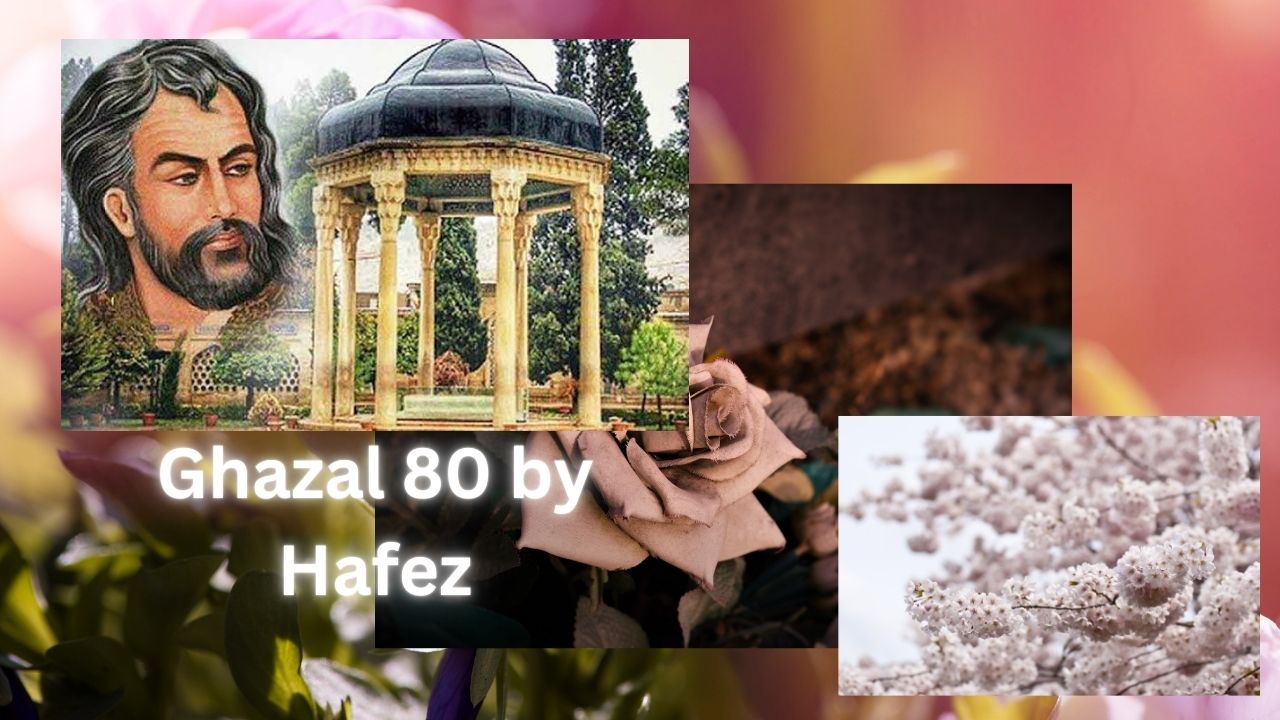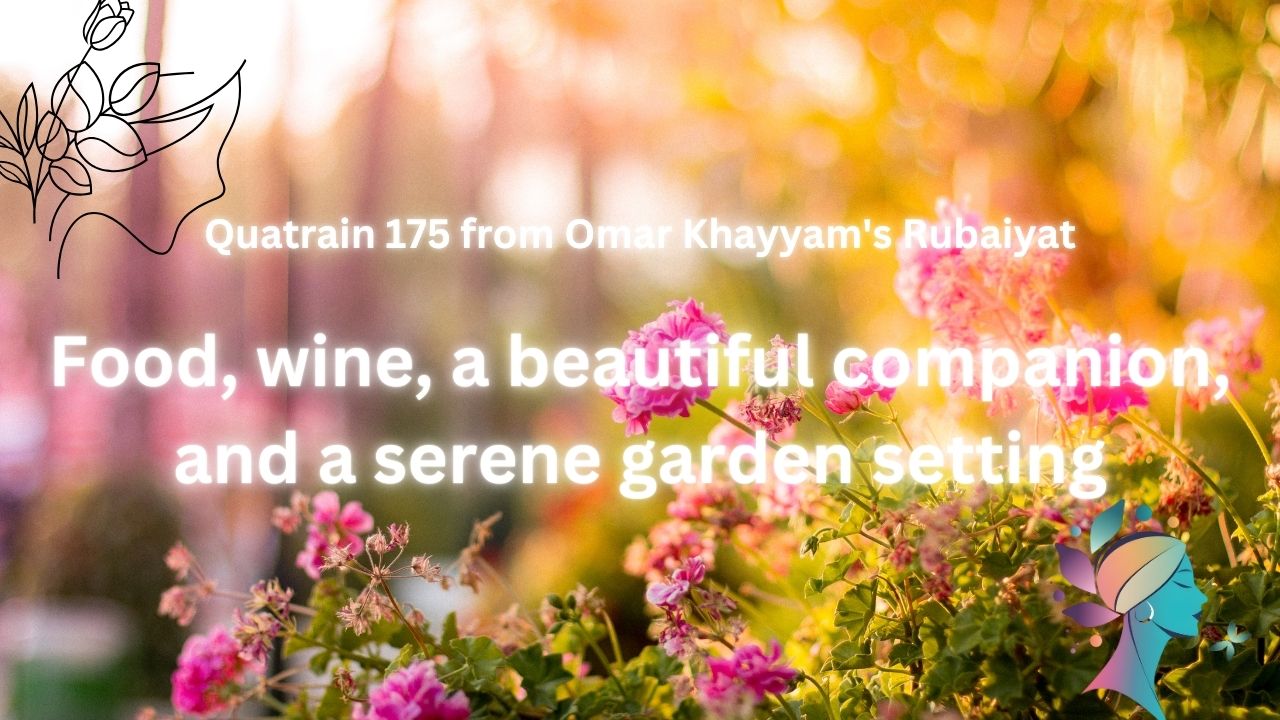In this post, we will go into the sweetness and beauty of Hafez's Ghazal 80, a lyrical masterpiece that continues to captivate readers centuries after its composition. We will present the poem in its original Persian form, followed by a precise English translation to ensure the message of the poem preserved even though there is difficulty in translating Persian poetry. To enrich our understanding, we will also provide a line-by-line analysis, trying to understand the poet's thoughts and emotions and also try to capture the poem’s message. Through this comprehensive approach, we aim to illuminate the profound beauty and timeless wisdom encapsulated within this remarkable piece of poetry.
Let’s begin!
عیبِ رندان مَکُن ای زاهدِ پاکیزهسرشت
که گناهِ دگران بر تو نخواهند نوشت
Don't criticize the revelers, O pure-hearted ascetic,
For the sins of others will not be written against you.
Understanding the Concept of "رندان" (Randan)
Randan are individuals who possess profound knowledge and understanding. They view themselves, God, and the world through the lens of love. Randan often disregard rigid societal, cultural, political, and even religious laws. They frequently create their own life rules, guided by their insights and knowledge. Despite their seemingly sinful or carefree exterior, Hafez portrays Randan as having pure hearts and clear consciences.
The Irony of "زاهدِ پاکیزه سرشت" (Zahed-e Paakize-ye Seresht)
The phrase "زاهدِ پاکیزه سرشت" (literally, "pure-hearted ascetic") is used ironically to signify the opposite. It's akin to saying "highly esteemed ascetic" today. This ironic usage is common, like saying "Mr. Personality" to someone lacking personality or "Mr. Scholar" to an ignorant person.
The Message of the Verse
The poet addresses a self-righteous ascetic, accusing them of judging Randan based on their appearance and engaging in slander. Even if the Randan commit sins, the ascetic should not worry that their sins will be attributed to him. Hafez, himself a leader among the Randan, reveals a fundamental principle of their philosophy: a heartwarming, ethical, and universal truth applicable everywhere. This principle contrasts sharply with the legalistic approach of those who enforce moral and ethical codes. In line three we will find out what is the principle of life in Hafez’s view.
***
Let’s move to verse two:
من اگر نیکم و گر بد تو برو خود را باش
هر کسی آن دِرَوَد عاقبتِ کار، که کِشت
If I am good or bad, you be yourself,
Everyone reaps what they sow in the end.
O ascetic, whether I, the reveler, am a sinner or a do-gooder, is none of your concern. Do not meddle in the affairs of others. You should be mindful of your own actions and understand that everyone will eventually reap what they sow. On the Day of Judgment, people will be judged based on their intentions, not their deeds. Therefore, many people who appear to perform good deeds may never achieve salvation because their intentions are evil and displeasing. No one knows the true intentions of another and cannot judge them.
***
Now the third verse:
همه کس طالبِ یارند چه هشیار و چه مست
همه جا خانهٔ عشق است چه مسجد چه کِنِشت
Everyone seeks a lover, whether sober or drunk,
Everywhere is a house of love, whether a mosque or a synagogue.
Everyone in this world, whether drunk or sober, with any belief or faith, is searching for love. In other words, everyone on earth can understand the language of love and accepts the religion of love by heart. Therefore, when one's intention is to draw closer to the eternal beloved, whether they worship in a mosque as a Muslim or at a fire temple as a Zoroastrian, both are acceptable and there is no difference between them. On the Day of Judgment, actions will be judged based on intentions, not behaviors. On the other hand, the primary goal of any religion or faith should be to create a better human being. If your adherence to the religion you are proud of, has not made you a better person, what is the point?
***
Let’s continue to the fourth verse
سرِ تسلیمِ من و خشتِ درِ میکدهها
مدعی گر نکند فهمِ سخن، گو سر و خشت
My head is bowed in submission at the tavern door,
If the claimant doesn't understand, let him say head and door.
As a reveler of the tavern, who has chosen the path of love to reach the eternal beloved, I have surrendered myself to this way of life and bowed my head in reverence to the threshold of the tavern. If the pretentious, the ascetic, and the preacher hear this and are unable to understand my state, don't explain too much; don't tire yourself in vain. Just say, 'It was the head of Hafez and the threshold of the tavern.' They are superficial and see only the head and the threshold. They pay no attention to people's intentions or inner selves, and they are ignorant of the subtleties and nuances of revelry. Speak to them in their own language. They do not understand the mystery of seeking refuge in taverns. The doors of taverns were usually short at that time, so when people entered, they had to bow and sometime they hit their heads to the wall. Hafez likens this bow to praying in mosque. Also Hafez says that in our way of life we may hit our head to the rock and face difficulties, but this is our own choice and we are happy with it.
***
The fifth verse says:
نا امیدم مکن از سابقهٔ لطفِ ازل
تو پسِ پرده چه دانی که که خوب است و که زشت
Don't make me despair of the past kindness of eternity,
You, behind the curtain, don't know who is good and who is bad.
The Eternal Grace: God is gracious and merciful, and has always been and will always be kind to all. This is still addressed to the misinterpreting ascetic and claimant. O ascetic, do not speak of hellfire and divine wrath with your baseless words. You have a distorted understanding of the Sharia and portray God as unkind. Do not make me lose hope in the divine grace that has been bestowed upon all His servants from eternity and will continue forever. You see only the outward appearance of people and make unjust judgments! How can you possibly know who is good and who is bad in the sight of God, behind the veil?
***
The sixth line says:
نه من از پردهٔ تقوا به درافتادم و بس
پدرم نیز بهشتِ ابد از دست بهشت
It's not only me who has fallen from the curtain of piety,
My father also lost the eternal paradise from paradise.
I'm not the only one who can't be pious. I'm not the only one who's curious and does things I shouldn't. My father, out of curiosity, tasted the fruit in paradise that he wasn't supposed to, and as a result, lost paradise and all its blessings. When God has placed curiosity in our human nature, we can't help but be curious.
***
And the final verse:
حافظا روزِ اجل گر به کف آری جامی
یک سر از کویِ خرابات بَرَندَت به بهشت
Hafez, on the day of death, if you hold a cup in your hand,
They will take you from the tavern alley straight to paradise.
O Hafez, if you are fortunate enough to have a cup of wine in your hand on the day of your death and surrender your soul to the Creator in a state of intoxication, be assured that you will be transported directly from the tavern to paradise and will be saved from the torment of the grave and the questioning. In the final couplet, Hafez delivers the final blow to the wounded ascetic, shattering the foundations of all his beliefs. In this couplet, he presents the tavern as a sacred place because in the tavern, there is no hypocrisy, pretense, or deceit. Worldliness, ambition, slander, fault-finding, judging others, nosiness, lies, and deceit have no place. All that exists is love, intoxication, and truth.
The state of the mind at final moments of the life is of huge importance. If you part this world when your heart is full of joy and happiness and you have less to regret, It may perceived as you had a successful life. Here Hafez says that if death finds me in a state of happiness and peace of mind, I am sure I am salvaged.
***





